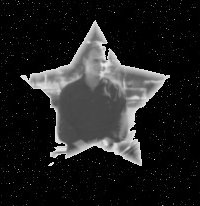
In Loving Memory
of
� Robert Allen Hise
of
� Robert Allen Hise
�
I'd like the memory of me to be a happy one,![]() After Glow
After Glow
I'd like to leave an afterglow of smiles when day is done,
I'd like to leave an echo whispering softly down the ways,
Of happy times and laughing times and bright and sunny days.
I'd like the tears of those who greive to dry before the sun,
Of happy memories that I leave behind when day is done.

Robert Allen Hise,
born September 8, 1971, Santa Clara, CA.
Entered into Eternal Life
August 19, 1994, San Jose, CA
Layed to rest at Oak Hill Memorial Park, San Jose Ca, Wednesday, August 24 1994, 10:30
am
Robert died of Epilepsy. born September 8, 1971, Santa Clara, CA.
Entered into Eternal Life
August 19, 1994, San Jose, CA
Layed to rest at Oak Hill Memorial Park, San Jose Ca, Wednesday, August 24 1994, 10:30
am

WHAT IS EPILEPSY ?
EPILEPSY is the term used to describe the tendancy in people to have recurrent spontaneous seizures. Epilepsy is the most common serious neurological disorder affecting people of all ages. There are at least 350,000 people with epilepsy in this country. Anyone can develop epilepsy; it occurs in all age, races and social classes. Seizures tend to start in infancy or by late adolesence, but the incidence rises again after 65.

WHAT IS A SEIZURE ?
A seizure (often call a fit and sometimes an attack, turn or blackout) happens when ordinary highly complex brain activity is suddenly disrupted. Seizures can take many forms, since the brain is responsible for such a wide range of functions. Intelligence, personality, mood, memory, sensations, movements and consciousness are all controlled within the brain; any of these functions may be temporarily disturbed during the course of an epileptic seizure. Other factors may also determine the type of seizure, such as whether the person is asleep or awake, what they are doing at the time, the type of epilepsy they have, and whether all or only part of the brain is affected. Not all seizures involve convulsions and many different terms are used. It is important to use terms which describe what is happening during the seizure. A person with epilepsy can experience more that one type of seizure, but the pattern of seizures tends to remain fairly constant in an individual.

TYPES OF SEIZURE.
GENERALISED SEIZURES. In this type a large part of the brain is involved immeadiately at the ouset. Consciousness is lost. What happens next is rather variable depending on the individual.
In some people either of the above may progress to a full blown convulsion. If this happens it is called a secondarily generalised seizure.

WHAT CAUSES SEIZURES?
If seizures tend to be triggered by the TV, precautions can be taken which do not stop the veiwer from watching, such as not sitting too close to the set and lighting the room adequately. Lack of sleep, exhaustion, boredom, anxiety, abrupt cessation of anti-epileptic treatment and drinking too much alcohol may also bring on seizures in people who already have epilepsy. Some very young children have a generalised convulsion at the onset of feverish illness, a 'febrile convulsion'. This is frightening to parents, but these are common events and do not constitute epilepsy. If a baby has recurrent febrile convulsions, preventative drug treatment may be recommended.

![]() Stanford Comprehensive Epilepsy Center
Stanford Comprehensive Epilepsy Center
![]() Epilepsy in young children
Epilepsy in young children
![]() Early diagnosis important
Early diagnosis important


Do you like the background set on this page. Well, visit Victorian Elegance and look around. You are bound to find something you like. I liked them all. :)
This page and all contents is copyright© by Judy Kimball Hise � on Oct 22, 1996
Last Modified: Friday, September 18, 1998 08:45 PM



